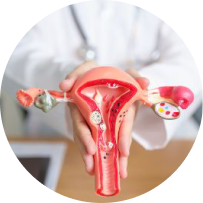
Post-Natal
All women should be given a comprehensive examination of their pelvic floor around the 6 week mark post-childbirth. Research shows that assessment of the pelvic floor following childbirth reduces the risk of long-term pelvic health issues.



Common symptoms experienced by women after giving birth
A 12 week exercise and educational programme designed for women to raise awareness of the pelvic floor, manage or restore pelvic health dysfunctions and prevent future issues from occurring.
- Pushing during labor can stress the pelvic floor and can lead to weakness in the muscles
- Challenges to control urine, stool or gas/wind
- Involuntary urine or bowel leakage
- Feeling like your bottom is falling out
- Pelvic heaviness or pressure
- Pelvic organ prolapse
- Diastasis (tummy muscle separation)
- Discomfort or pain in hips, low back, pelvis, perineum (the area between the anus and the vulva in females)
- Perineal tears and episiotomy
- Painful intercourse (due to hormonal changes)
- Dryness or sensitivity in vaginal tissues
- Painful sex (also due to hormonal changes)

Caesarean-Section (C-section)
Even with a C-section, the pelvic floor muscles can be impaired. During this procedure, 7 layers of abdominal muscles are cut through! As a result, these muscles are weakened post-op, which in turn impairs the function of pelvic floor muscles.
Common symptoms post c-section;
- Pain following surgery can lead to excessive tightness of the pelvic floor muscles, and if these muscles cannot relax, they become weak overtime.
- Tight pelvic floor muscles can cause urinary incontinence (leakage)
- Scar tissue can stick to nearby organs or structures, causing pain, muscle tightness around the abdominal and pelvic area and restrictions in movement, which subsequently reduces your function.



Even if you don’t experience any of the symptoms above post childbirth, it is likely that there is some weakness in the pelvic floor muscles because of hormones and the baby’s weight stretching these muscles for up to 9 months. In the long term, this could lead to issues such as a prolapse and when approaching menopause, where hormonal changes occur, these issues could be exacerbated.
It is for the reasons above that the pelvic health and a pelvic floor exercise rehabilitation programme should be a key focus post-partum, to prevent the long term impact on mothers.



what clients say about the Adore Your Pelvic Programme


Stay Updated with Our Newsletter
Sign up to receive the latest news, tips, and updates from Wellrestorer delivered straight to your inbox.

Don’t miss out on expert advice and resources to support your well-being.

